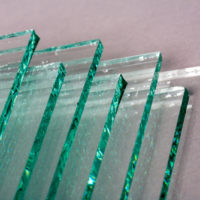 Glass is a versatile material used in various applications, from windows and doors to luxurious interior design elements. But did you know that there are different types of glass, each with its own unique properties and suggested uses? In this blog post, we will delve into the various types of glass, exploring their pros and cons, and providing suggestions for optimal use.
Glass is a versatile material used in various applications, from windows and doors to luxurious interior design elements. But did you know that there are different types of glass, each with its own unique properties and suggested uses? In this blog post, we will delve into the various types of glass, exploring their pros and cons, and providing suggestions for optimal use.
1. Float Glass
Float glass is the most common type of glass used in everyday applications. It is manufactured by floating molten glass on a bed of molten metal, resulting in a smooth and uniform surface. The pros of float glass include its affordability and ease of production. It also allows for excellent light transmission, making it ideal for windows and glass doors in residential and commercial buildings. However, float glass is not as strong as other types and can easily break under impact or thermal stress.
2. Tempered Glass
Tempered glass is a safety glass that undergoes a heating and cooling process to increase its strength. When broken, it shatters into small, harmless pieces, reducing the risk of injury. The pros of tempered glass include its safety features, resistance to thermal stress, and durability. It is commonly used in shower doors, glass walls, and automobile windows. However, tempered glass cannot be modified once it is manufactured, limiting its use in decorative applications.
3. Laminated Glass
Laminated glass is made by sandwiching a layer of plastic between two layers of glass. The plastic interlayer holds the glass together when shattered, providing increased safety and security. The pros of laminated glass include its ability to block UV rays, reduce noise transmission, and enhance security. It is commonly used in building facades, skylights, and automotive windshields. The plastic interlayer, however, can be prone to discoloration over time and may require periodic replacement.
4. Low-E Glass
Low-E (low-emissivity) glass is coated with a thin, transparent layer that reduces the amount of ultraviolet (UV) and infrared (IR) radiation that passes through. The pros of low-E glass include its energy-efficient properties, as it helps to insulate a building by reducing heat transfer. It also prevents furniture and fabrics from fading due to UV exposure. Low-E glass is commonly used in windows and doors in regions with extreme climates. However, it tends to be more expensive than regular float glass.
5. Patterned Glass
Patterned glass features decorative designs or textures imprinted on its surface, giving it a unique aesthetic appeal. The pros of patterned glass include its ability to provide privacy while still allowing light to pass through. It is commonly used in interior partitions, shower enclosures, and decorative glass elements. However, patterned glass may be more challenging to clean, as dust and dirt can accumulate in the pattern grooves.
6. Wired Glass
Wired glass is a type of safety glass that contains wire mesh embedded within the glass. The pros of wired glass include its fire resistance and ability to provide a barrier against the spread of flames and smoke. It is commonly used in fire-rated doors, windows, and partitions. However, wired glass is not as impact-resistant as other types and can break more easily when subjected to force.
7. Tinted Glass
Tinted glass is manufactured by adding colorants during the glassmaking process, resulting in a variety of hues. The pros of tinted glass include its ability to reduce glare, control heat gain, and provide privacy. It is commonly used in commercial buildings, vehicles, and residential windows. However, tinted glass may reduce the amount of natural light entering a space and can be more expensive than regular float glass.
8. Frosted Glass
Frosted glass is created by etching or sandblasting the surface of the glass, resulting in a translucent appearance. The pros of frosted glass include its ability to provide privacy while still allowing diffused light to enter a space. It is commonly used in interior doors, windows, and partitions. However, frosted glass may require regular cleaning to remove smudges and fingerprints.
Conclusion
Understanding the different types of glass is crucial when considering its use in various applications. Whether you need safety glass, energy-efficient glass, or decorative glass, each type has its own advantages and considerations. By choosing the right type of glass for your specific requirements, you can ensure optimal functionality, aesthetics, and durability in your next project.
Working with Palmetto Glass of Beaufort LLC
Established in 2011, Palmetto Glass of Beaufort LLC is a glass service based in Beaufort, South Carolina. We specialize in providing a wide variety of services including shower enclosures, mirrors, windows, accessories, and more. With over 20 years of servicing our community, we value providing quality work and outstanding customer service. Contact us today for more information!
